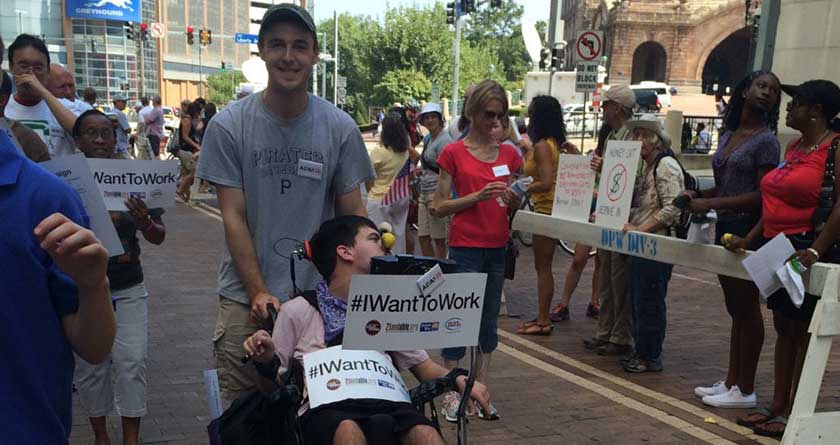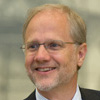
“Just like anyone else.”
If those four words resonate, it is because we all share a deep human desire to be treated as everyone else is treated and to be given the same opportunities as those around us enjoy.
They are also the most potent words available in communicating about the rights and needs of the millions of Americans who have some form of disability.
We often think of disability in its most traumatic forms, but a loss of mobility, sensory perception, or cognitive ability will happen to all of us to some degree the longer we live. The realization that such loss will occur and is normal should make us all more sensitive to disability in its many forms.
Regardless of our stage of life, we or someone we care about can acquire a disability for a short or long period due to illness or an accident, if not as a result from a condition from birth or aging. The Centers for Disease Control reports that 1 in 5 people in the U.S., or 20% of the population, has a disability.
But recognizing and accepting that disability is a normal part of our personal, family and community life is just a first step. We also need to be aware of and committed to addressing the ways in which people with physical, sensory, intellectual or mental health disabilities are “othered” in our society and often face a range of unintentional and deliberate barriers.
For all the ways in which the federal Americans with Disabilities Act has improved opportunity and access for people with disabilities, there are still too many who are left out of various aspects of our society or experience inequity from our institutions, including educational, economic, and criminal justice systems.
The disability awareness and advocacy nonprofit RespectAbility reports that students with disabilities are more than twice as likely to receive an out-of-school suspension than students without disabilities. Overall, only 65% of students with disabilities graduate high school compared to 84% of students without disabilities. Out of more than 20 million working-age people with disabilities, only 7.5 million have jobs.
According to the Bureau of Justice Statistics, 32% of federal prisoners and 40% of people in jail have at least one disability. And RespectAbility estimates that this means more than 750,000 people with disabilities are behind bars in America today, with the largest group — more than half a million people — those with cognitive impairments.
Even the philanthropic arena suffers from errors of omission if not commission when it comes to disability. My friend Darren Walker, president of the Ford Foundation, shone a powerful light on this when he bravely acknowledged his organization’s own blind spot in terms of fully incorporating people with disabilities in the foundation's work and practice.
In a heartfelt exploration of Ford’s need to better address disability inequity, he described the foundation as “an organization composed of individuals with different inherent biases…not immune to ignorance. While checking each other’s ignorance in one area, we may simultaneously—and unconsciously—reinforce and even ratify it in another. In this way, an absent voice or constituency may not merely be unconsidered; it may as well not exist.”
The same can be said the Endowments, of philanthropy, and of human society more broadly. Intentionally or not, what we do not actively embrace with our attention, our listening, our engagement and our support, we place “outside,” in a different realm where “just like anyone else” so easily morphs into “not like us.” And “not like us” is a realm where every act of injustice and neglect can be condoned, excused or forgotten.
For philanthropy, the imperative is to understand how disability issues intersect all of our efforts. I have written this before but it bears repeating here: Either our work is ultimately about building a more just and inclusive society for everyone, or it is a sham. There can be no blind spots on the path to justice, no left-behind people on the journey to inclusion.
Fortunately, we at the Endowments have partners who are helping to educate and inspire us. The FISA Foundation, led by the irrepressible Kristy Troutman, has gently nudged us to broaden our vision of inclusivity and raised our awareness of the ways in which we can improve disability access in our operations as well as encourage and guide our grantees to do the same.
The Ford Foundation is serving as a role model in this arena with its disability-specific grantmaking and efforts to be more disability-inclusive in its own operations. At the same time, Ford is fostering new conversations about equity and disability across the country.
As part of our efforts, the Endowments is partnering with FISA to launch a new initiative, Disability Inclusion & Access: Moving Forward. After originally planning to focus on learning activities for the Endowments’ staff, we realized that our grantees and peer funders also would benefit from additional education. So, we are making available a series of learning opportunities to the broader community, beginning with a Nov. 21 convening at the Senator John Heinz History Center for nonprofit, community and foundation leaders. Darren has graciously agreed to be our keynote.
In addition, we are posting on the FISA Foundation and Endowments’ websites a guide to groups and materials that can assist organizations in removing basic barriers to disability access in areas such as websites, social media posts, documents/reports, meetings and events, and offices and program spaces. FISA and the Endowments also will be starting a small grants program to support nonprofits in removing barriers and promoting inclusion.
We haven’t figured everything out in terms of our role in advancing disability equity through our work. We are still learning how to better incorporate disability awareness as a routine part of our organizational life. But we understand that if we are serious about equity and fairness for everyone, this is something we must do. Our work will not be complete without it.
The truest lesson I have learned in philanthropy is that the people we purport to help actually help us more—if we are open to the wisdom, lessons and strengths they have to offer. What we learn, ultimately, is that we are all vulnerable, connected, mutually dependent, and in need of help from time to time. To understand what people with disabilities seek, just drop the words “with disabilities.” Whatever modifiers may be placed by our names in the course of our lifetimes by a society that loves to label, what we all want is the opportunity to pursue dreams, build lives, be productive, and contribute.
Just like anyone else.
Written by:

Grant Oliphant
President
